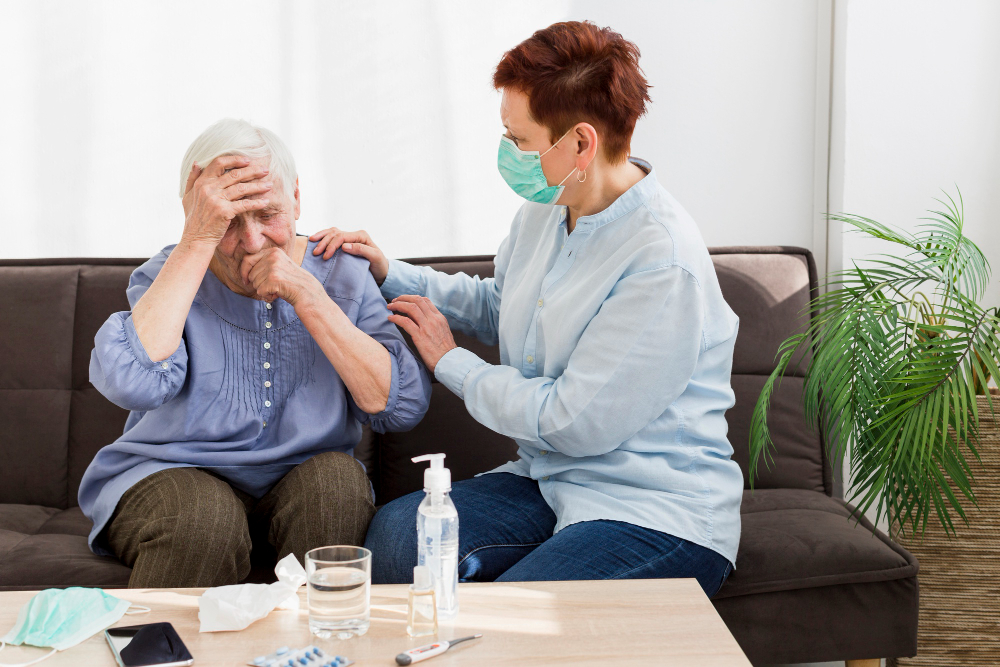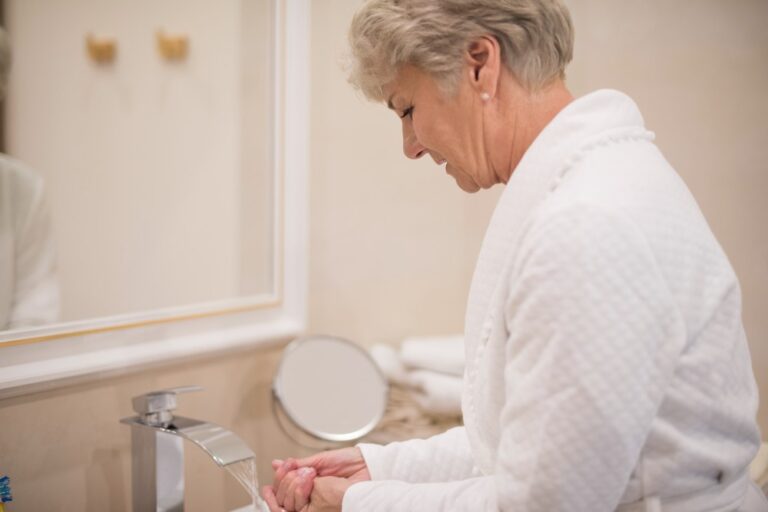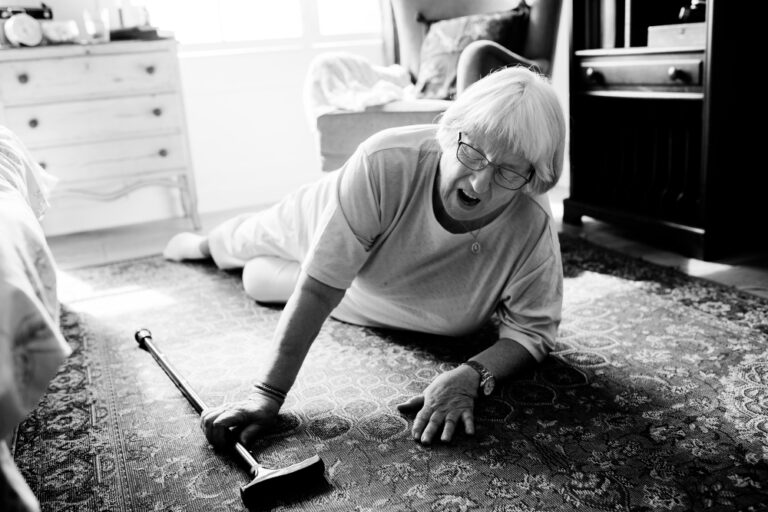Depression doesn’t discriminate by age, yet it often hides behind the curtain of ageing, especially in seniors. As older adults face significant life changes—from retirement to health challenges or the loss of loved ones—the risk of depression increases. Unfortunately, depression in seniors is commonly overlooked, misdiagnosed, or mistaken for signs of ageing.
At From The Heart Home Care, we understand that emotional well-being is a cornerstone of overall health. We are committed to raising awareness about senior depression, identifying the signs, and providing support that empowers seniors and their families.
What Is Depression?
Depression, clinically known as major depressive disorder (MDD), is a serious mental health condition marked by persistent sadness, loss of interest in previously enjoyed activities, and a variety of emotional and physical issues. It’s more than just “feeling down” — it’s a chronic condition that affects how a person thinks, feels, and functions on a daily basis.
While depression can affect anyone, its impact on older adults is often under-recognised. Many assume that feeling unhappy or withdrawn is simply part of ageing. In reality, these could be signs of a deeper, treatable issue.
Why Are Seniors at Higher Risk of Depression?
Depression in the elderly is influenced by several unique factors. While the biological mechanisms may be similar to those in younger adults, seniors face distinct life stressors that contribute to emotional distress.
1. Loss and Grief
One of the most common triggers is the loss of a spouse, friend, or close companion. The absence of daily emotional connection can lead to feelings of loneliness, despair, and eventually, depression.
2. Social Isolation
Many seniors experience reduced social interaction due to mobility issues, retirement, or family living far away. Social isolation can be a powerful factor in triggering depressive symptoms.
3. Chronic Illness and Physical Limitations
Conditions such as arthritis, heart disease, stroke, Parkinson’s disease, and diabetes can contribute to ongoing physical pain and a diminished sense of independence—both of which are associated with depression.
4. Cognitive Decline
While depression is not a normal part of ageing, it can sometimes occur alongside dementia or Alzheimer’s disease, making diagnosis and treatment more complex.
5. Medication Side Effects
Some medications prescribed for chronic illnesses may have depressive side effects, further exacerbating mental health challenges.
Common Symptoms of Depression in Seniors
Recognising the signs of depression is the first step to seeking help. Unfortunately, depression symptoms in seniors often mimic signs of ageing or other health issues, making diagnosis more difficult.
Here are key signs to watch for:
- Persistent feelings of sadness, hopelessness, or emptiness
- Loss of interest in hobbies and social activities
- Fatigue or decreased energy
- Sleep disturbances—either insomnia or oversleeping
- Difficulty concentrating or making decisions
- Irritability or restlessness
- Unexplained physical ailments (headaches, digestive issues, etc.)
- Changes in appetite or weight
- Feelings of guilt, worthlessness, or helplessness
- Thoughts of death or suicide
If a senior exhibits multiple symptoms over a period of two weeks or more, it’s crucial to consult a healthcare professional.
Diagnosing Depression in Older Adults
Diagnosing geriatric depression requires a comprehensive approach. Medical professionals must differentiate between symptoms of depression and other age-related health issues like dementia, medication side effects, or chronic illness.
A typical assessment may include:
- Mental health screening tools like the Geriatric Depression Scale (GDS)
- Medical history and medication review
- Interviews with caregivers or family members
- Physical exams and lab tests to rule out underlying health conditions
The Emotional Impact of Untreated Depression
If left untreated, depression can take a significant toll on a senior’s overall quality of life. It can worsen existing health problems, increase the risk of cognitive decline, and even raise the chances of premature death due to suicide or poor self-care.
Most heartbreaking is that many seniors suffer in silence, believing their emotional pain is just a part of getting older. It’s not.
Effective Treatment Options for Senior Depression
The good news? Depression is treatable, even in the elderly. Many seniors experience a dramatic improvement in symptoms with the right combination of care, treatment, and social support.
1. Psychotherapy and Counselling
Therapy helps seniors express their thoughts and emotions while learning coping strategies.
Cognitive Behavioral Therapy (CBT), in particular, is highly effective in treating depression by addressing negative thought patterns.
Other therapeutic approaches include:
- Interpersonal Therapy (IPT): Focuses on improving personal relationships
- Problem-Solving Therapy (PST): Helps seniors manage everyday challenges
- Grief Counselling: Assists in processing the loss of loved ones
2. Medication
Antidepressants, such as SSRIs (Selective Serotonin Reuptake Inhibitors), may be prescribed. However, it’s essential for physicians to carefully monitor interactions with other medications and adjust doses for seniors accordingly.
3. Lifestyle Changes
Simple daily routines can make a big difference:
- Regular physical activity (e.g., walking or chair exercises)
- Healthy meals to nourish both body and mind
- Consistent sleep schedule
- Staying mentally engaged through puzzles, reading, or learning new skills
4. Social Interaction and Support
Connection combats depression. Seniors benefit greatly from spending time with family, joining community groups, or receiving regular companionship from a home care provider.
5. In-Home Care Services
At From The Heart Home Care, we know that sometimes the best environment for healing is one’s own home. Our compassionate caregivers are trained to provide not only physical assistance but also emotional companionship.
Learn More: Climate Change and the Health of Older Adults
How From The Heart Home Care Supports Seniors with Depression
We go beyond just helping with daily tasks. Our mission is to support the emotional and mental health of every client.
Here’s how we can help:
✔ Personalised Care Plans
Every senior is unique. We design tailored care plans that align with the individual’s physical needs and emotional well-being.
✔ Companionship and Emotional Support
Loneliness is one of the leading causes of depression in seniors. Our caregivers offer friendly conversation, social engagement, and a warm presence that promotes emotional healing.
✔ Medication Reminders and Health Monitoring
We ensure that seniors stay on top of their health, from timely medication reminders to monitoring mood changes and communicating with families or healthcare providers when needed.
✔ Family Support and Communication
We keep families in the loop, providing peace of mind and involving loved ones in the care process every step of the way.
When to Seek Help
If you suspect that your loved one is struggling with depression, don’t wait. Early intervention is key. Depression is not a character flaw or a sign of weakness—it’s a medical condition that responds well to treatment.
Some signs that it’s time to seek help include:
- A noticeable decline in mood lasting more than two weeks
- Withdrawal from social interaction or family events
- Sudden changes in behaviour or speech
- Expressions of hopelessness or a desire to die
Learn More: Why Post-Hospitalisation Care is Crucial for Faster Recovery
Final Thoughts
Depression in seniors is common but not inevitable. With the right understanding, care, and professional support, older adults can enjoy a rich and fulfilling life—even in the face of past losses or current health struggles.At From The Heart Home Care, we’re here to help your loved one rediscover comfort, confidence, and companionship in the place they feel most at ease — home







